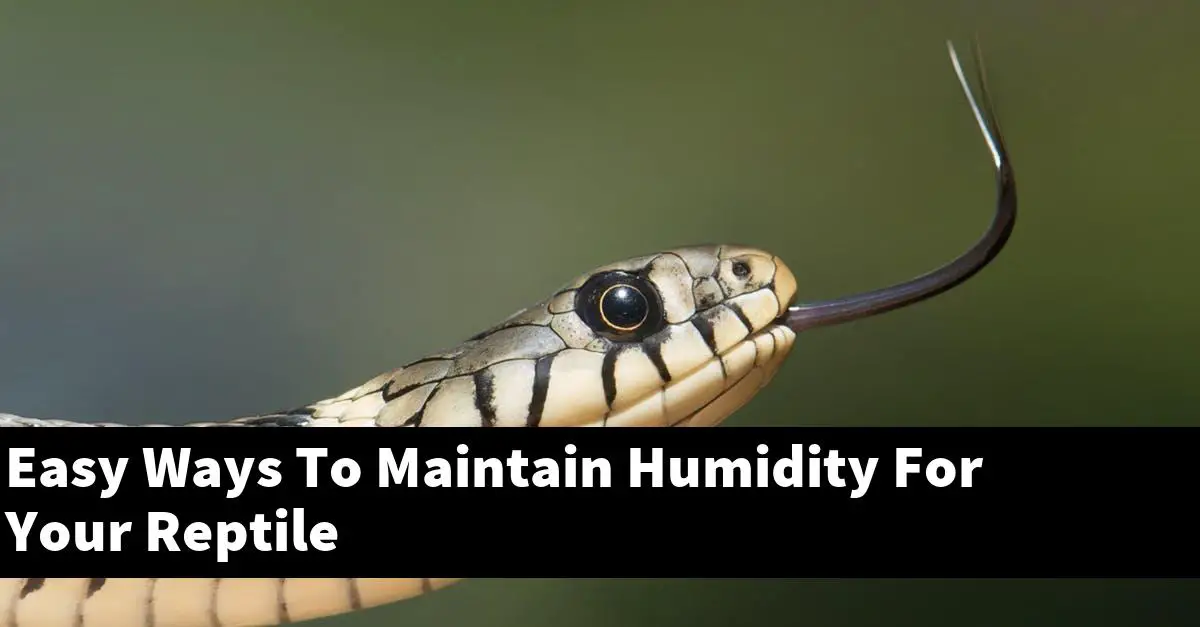Reptiles are ectothermic, meaning they rely on their environment to regulate their body temperature. Many reptiles also require high humidity levels to stay healthy. If you have a reptile as a pet, there are several easy ways to maintain the proper humidity level for your pet.
There are several easy ways to maintain the proper humidity level for your reptile pet including using a humidity gauge to monitor the humidity level, using a reptile fogger or mister to add moisture to the air, and using a reptile humidifier to add moisture to the air.
There are a few easy ways to maintain humidity for your reptile.
- One way is to use a substrate that retains moisture, such as cypress mulch or moss.
- Another way is to mist the enclosure daily with a water bottle.
- You can also install a humidifier in the room where the reptile enclosure is located.
The article will be discussing different ways to maintain humidity for your reptile.
Table of Contents
What are the benefits of maintaining humidity for your reptile?
Maintaining humidity for your reptile is important for several reasons. reptiles are ectothermic, meaning that they rely on their environment to regulate their body temperature.
If the air around them is too dry, they will have difficulty maintaining their body temperature and may become stressed.
In addition, many reptiles come from humid environments and need high humidity levels to stay healthy. Without adequate humidity, they may become dehydrated or develop respiratory problems.
Maintaining humidity levels can be difficult, but it is important to do so if you want your reptile to be healthy and happy.
What are some easy ways to maintain humidity for your reptile?
There are a few things you can do to help maintain humidity levels.
First, you can use a humidifier in your reptile’s enclosure. This will help to keep the air around your reptile moist.
You can also mist your reptile’s enclosure with water a few times a day. This will help to raise the humidity levels in the enclosure.
Finally, you can choose to house your reptile in a glass enclosure.
Glass will help to hold in moisture better than other materials, such as plastic.
By taking a few simple steps, you can help to ensure that your reptile has the humidity levels it needs to stay healthy and happy.
How can you tell if your reptile is humidity stressed?
There are a few things you can look for to determine if your reptile is humidity stressed.
The first is to check for excessive shedding. If your reptile is shedding more than usual, it could be a sign that the humidity level is too low.
Another sign is if your reptile is having difficulty breathing. If you notice your reptile gasping for air or panting, it could be a sign of respiratory distress, which can be caused by low humidity levels.
Finally, if your reptile is not eating or appears to be lethargic, it could also be a sign of stress due to low humidity levels.
If you notice any of these signs, it is important to take action to increase the humidity in your reptile’s enclosure.
What are some common causes of low humidity for reptiles?
There are several reasons why the humidity in a reptile’s enclosure may be too low.
The most common reason is that the enclosure is too large.
A larger enclosure will have more air space, which will cause the humidity to drop.
Another common reason is that the enclosure is not well-ventilated.
Poor ventilation will cause the humidity to build up and the temperature to drop.
Finally, if the enclosure is not properly humidified, the humidity will drop.
Summary
Maintaining humidity for your reptile is important for several reasons. reptiles are ectothermic, meaning that they rely on their environment to regulate their body temperature. If the air around them is too dry, they will have difficulty maintaining their body temperature and may become stressed.
In addition, many reptiles come from humid environments and need high humidity levels to stay healthy. Without adequate humidity, they may become dehydrated or develop respiratory problems.

